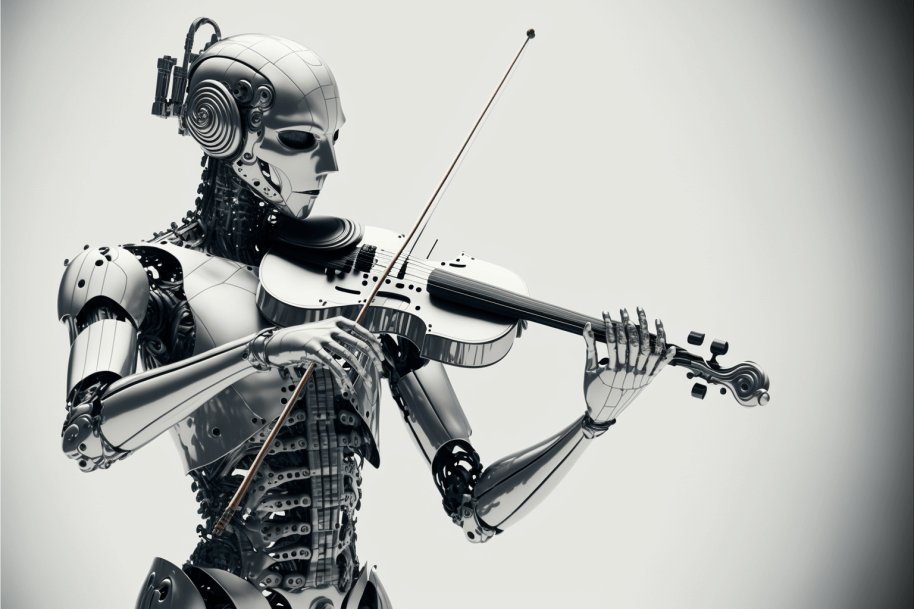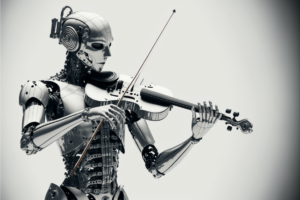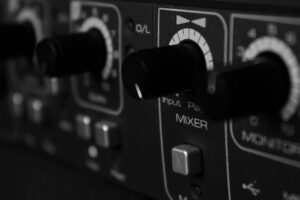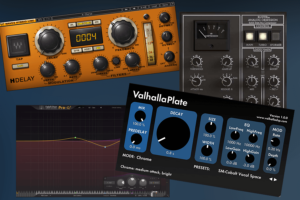- ,
- , Production Tips
How to Create Better Music with AI: An Overview of the Technology and Tools

The music industry is constantly evolving, and technology has played a major role in shaping its evolution. Artificial intelligence (AI) is the latest technology to hit the music industry, and it has the potential to revolutionize the way we create, produce and consume music. AI can be used to generate new music, improve sound quality, and analyze audience engagement, among other things. It can help musicians and producers to create new sounds, reach new audiences, and streamline their production process. In this guide, we will explore the benefits of using AI in music production, and provide an overview of the different types of AI used in music production, the tools and software available, and how to get started with using AI in your music production process.
The use of AI in music production is not a new concept, but recent advancements in AI technology have made it more accessible and efficient for musicians and producers. AI can be used to compose, arrange, and produce music, as well as to analyze audience engagement and optimize music releases. This allows musicians and producers to quickly generate new ideas and explore new sounds, and also to make more informed decisions about which songs to release and when to release them.
AI can also be used to create unique and personalized sounds, which can open up new possibilities for sound design and experimentation. Additionally, AI-powered tools and software can be used to analyze audio data and make predictions about how to improve sound quality, which can lead to more polished and professional-sounding music.
However, using AI in music production also comes with its own set of challenges and limitations. One concern is the potential for AI to replace human musicians and composers. While AI can be used to generate new music and improve sound quality, it cannot replicate the creativity and emotion of human musicians. Additionally, there is a risk that AI-generated music could be used to exploit musicians and devalue the role of music creators in the industry.
In this guide, we will explore the different types of AI used in music production, the tools and software available, and how to get started with using AI in your music production process. We will also discuss advanced techniques for using AI in music production, the challenges and limitations of using AI in music production, and the future of AI in music production. By the end of this guide, you will have a better understanding of how to use AI in music production and how to stay up to date with the latest developments in AI and music production.
The Different Types of AI used in Music Production
AI is a broad term that encompasses various technologies such as machine learning, natural language processing, and generative algorithms. Understanding the different types of AI is essential for making the most of AI in music production.
Machine learning is one of the most common types of AI used in music production. It involves training a computer to recognize patterns and make predictions based on data. In music production, machine learning can be used to generate new music, improve sound quality, and analyze audience engagement.
Natural Language Processing (NLP) is another type of AI that can be used in music production. It allows computers to understand human language and can be used to create personalized music recommendations or analyze audience engagement.
Generative algorithms are another type of AI that can be used in music production. They can be used to generate new music or create unique and personalized sounds. They can also be used to create new sounds that are not possible to create with traditional synthesis methods.
Advanced Techniques for Using AI in Music Production
Using AI to generate new music
One of the most exciting applications of AI in music production is the ability to generate new music. AI-powered music composition software such as Amper Music and AIVA can create original music based on user input, such as preferred tempo, mood, and genre. This allows musicians and producers to quickly generate new ideas and explore new sounds. Additionally, AI can be used to compose and arrange entire songs, which can help streamline the songwriting process.
Using AI to improve sound quality and mastering
Machine learning algorithms can be used to analyze audio data and make predictions about how to improve sound quality. For example, AI-powered mastering software such as LANDR can analyze audio data and automatically make adjustments to levels, EQ, and compression to improve overall sound quality. This can help save time and effort for the musician or producer, and also improve the final product.
Using AI to create unique and personalized sounds
Generative algorithms can be used to generate new sounds that are not possible to create with traditional synthesis methods. This can open up new possibilities for sound design and experimentation. Additionally, AI can be used to generate new sounds and effects that are not possible to create with traditional methods, allowing the musician to explore new sounds and create unique music.
Using AI to analyze audience engagement and optimize music releases
Natural language processing can be used to analyze social media data and understand how audiences are responding to different songs or albums. This can help musicians and producers make informed decisions about which songs to release and when to release them. Additionally, AI can be used to analyze the performance of a song on streaming platforms, which can inform the musician or producer on how to optimize the releases and marketing of their songs.
Challenges and Limitations of Using AI in Music Production
The ethical considerations of using AI in music production
As with any technology, there are ethical considerations to using AI in music production. One concern is the potential for AI to replace human musicians and composers. While AI can be used to generate new music and improve sound quality, it cannot replicate the creativity and emotion of human musicians. Additionally, there is a risk that AI-generated music could be used to exploit musicians and devalue the role of music creators in the industry.
The limitations of current AI technology
AI technology is still in its early stages, and there are limitations to what it can currently accomplish in music production. For example, AI-generated music may lack the nuance and complexity of music created by human musicians. Additionally, AI-powered tools and software are only as good as the data they are trained on, and there is a risk that biases in the data could lead to biased results.
The importance of balancing AI with human creativity and input
Despite the limitations of AI technology, it can still be a valuable tool for musicians and producers. However, it’s important to balance the use of AI with human creativity and input. This can help ensure that the music produced is of high quality and that the creativity and emotion of human musicians is not lost. Additionally, it’s important to consider the ethical implications of using AI in music production and to be aware of the limitations of the technology.
Examples of Songs (Tracks) Made with AI
In recent years, many musicians and producers have started to experiment with using AI in music production. The following are examples of songs that have been created or produced using AI.
1.”Break Free” by Taryn Southern: This song was created using Amper Music‘s AI music composition software. The lyrics and melody were written by Taryn Southern, while the music was generated by the software. Listen to the song here:
Conclusion
The future of AI in music production
As AI technology continues to advance, it’s likely that we will see more and more applications of AI in music production. This will open up new possibilities for musicians and producers, such as the ability to generate new music and analyze audience engagement. However, it’s important to be aware of the ethical considerations and limitations of AI technology and to balance the use of AI with human creativity and input.How to stay up to date with the latest developments in AI and music production
To stay up to date with the latest developments in AI and music production, you can follow industry news and developments, attend conferences and workshops, and engage with other musicians and producers who are using AI in their work. Additionally, you can use online resources such as tutorials and forums to learn more about the tools and software available for using AI in music production.The potential of AI to revolutionize the music industry
The potential of AI to revolutionize the music industry is huge. With AI, musicians and producers can generate new music, improve sound quality, and analyze audience engagement, among other things. This can open up new possibilities for musicians and producers to create and share new sounds and reach new audiences. While it’s important to be aware of the ethical considerations and limitations of AI technology, the potential benefits of AI in music production are undeniable.Share this post

How to Create Better Music with AI: An Overview of the Technology and Tools

5 Tips for Achieving a Professional Sound Without Breaking the Bank
